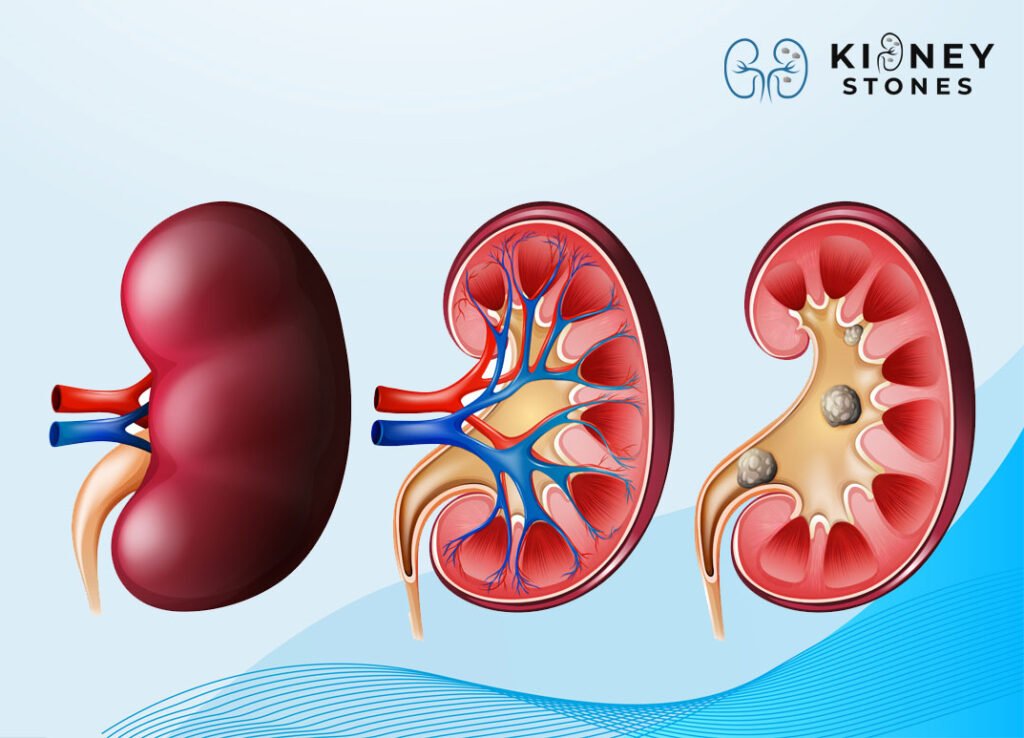Kidney Stones Symptoms - Overview
Kidney stone symptoms are a common indicator of this urological condition that affects many individuals worldwide. Understanding these symptoms is crucial for early diagnosis and effective treatment. This guide delves into the symptoms of kidney stones, helping you recognize when to seek medical attention from the best kidney stone specialist in Hyderabad.

Introduction to Kidney Stones
What Are Kidney Stones?
Kidney stones are hard deposits made of minerals and salts that form inside your kidneys. They can affect any part of your urinary tract, from your kidneys to your bladder. Stones form when the urine becomes concentrated, allowing minerals to crystallize and stick together.
Types of Kidney Stones
- Calcium Stones: The most common type, often made of calcium oxalate.
- Uric Acid Stones: Common in people who lose too much fluid due to chronic diarrhea or malabsorption.
- Struvite Stones: Form in response to an infection, such as a urinary tract infection.
- Cystine Stones: Form in people with a hereditary disorder that causes the kidneys to excrete excessive amounts of certain amino acids.
Common Kidney Stone Symptoms

Severe Pain
One of the hallmark symptoms of kidney stones is severe pain, also known as renal colic. This pain often begins suddenly when a stone moves into the ureter, the narrow tube connecting the kidney and bladder.
- Location of Pain: Pain typically starts in the side or back, below the ribs, and may radiate to the lower abdomen and groin.
- Intensity of Pain: The pain can be excruciating and may come in waves, fluctuating in intensity as the stone moves.
Hematuria (Blood in Urine)
Another common symptom is blood in the urine, known as hematuria. The urine may appear pink, red, or brown, indicating the presence of blood.
- Visible Blood: Blood can be seen with the naked eye.
- Microscopic Hematuria: Sometimes, blood is not visible and is only detected under a microscope during a urinalysis.
Frequent and Painful Urination
Kidney stones can cause an increased urge to urinate, as well as pain during urination.
- Frequency: The need to urinate more often than usual.
- Dysuria: Pain or burning sensation during urination.
Nausea and Vomiting
The severe pain caused by kidney stones can lead to nausea and vomiting. This is due to the connection between the kidneys and the gastrointestinal tract, where the body reacts to the intense discomfort.
Cloudy or Foul-Smelling Urine
Changes in the appearance and smell of urine can indicate the presence of kidney stones.
- Cloudy Urine: May indicate an infection in addition to stones.
- Foul-Smelling Urine: Can be a sign of infection.
Less Common Symptoms of Kidney Stones
Fever and Chills
If a kidney stone causes an infection, symptoms such as fever and chills may occur. This is a serious condition and requires immediate medical attention.
Urinary Retention
In some cases, a kidney stone can cause a blockage in the urinary tract, leading to urinary retention. This can result in a decreased ability to urinate or a complete inability to pass urine.

When to See a Doctor
Recognizing Serious Symptoms
It’s crucial to seek medical attention if you experience any of the following:
- Severe Pain: Especially if it is sudden and intense.
- Blood in Urine: Persistent or severe.
- Difficulty Urinating: Including complete urinary retention.
- Fever and Chills: Accompanied by pain and other symptoms.
Consulting the Best Kidney Stone Specialist in Hyderabad

If you suspect you have kidney stones, consulting a specialist is essential for proper diagnosis and treatment. The best kidney stone specialist in Hyderabad can provide expert care and guidance, ensuring the best possible outcomes.
Keep on writing, great job! https://zeleniymis.com.ua/